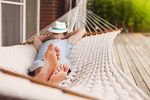
Dave, did you sing Rock a bye baby to your kids? I did and man, did I want them to fall asleep fast! But you know, it's not the song that works; it's the rocking.
Now a study in Switzerland proves rocking doesn't just put a baby to sleep, but adults too. The study showed that rocking alters brain activity and benefits sleep and memory in grownups. Okay, I want someone to rock me to bed. Don't look at me! There are actually rocking beds on the market now.
And it may be good business because the study was pretty sound. It had healthy adults spend multiple nights in a sleep lab switching between a rocking or stationary bed. The results were striking. Sleeping in a rocking bed allowed the person to fall asleep faster, sleep deeper and for longer periods compared to a stationary bed. The next day they also tested better on recalling pairs of words they learned the night before.
What's the explanation? A recent study looked at the mouse vestibular system found inside the inner ear. Humans and other mammals also have this system and it's like a labyrinth. It's how we perceive motion, maintain balance, and sense up and down in relation to gravity.
Rocking apparently stimulates this system and triggers a type of rhythmic synchronicity with the brain's activity during sleep. The mice fell sleep quicker just as did people in the Swiss study. The mice also spent more time in the second stage of sleep when heart rate and breathing slow down.
This study supports the human sleep study that rocking's effect on the vestibular system is improving sleep. But we need more studies to validate these findings, so don't rush out to buy a rocking bed yet. One is priced at several thousand dollars and for that you'd want a guarantee of a good night's sleep.
More Information
Rocking Improves Sleep, Boosts Memory
Sleeping on a rhythmically swaying surface helps synchronize sleep oscillations in the human brain, a study finds...
Whole-Night Continuous Rocking Entrains Spontaneous Neural Oscillations with Benefits for Sleep and Memory
By showing how rhythmic sensory stimuli actively entrain EEG brain waves of sleep, this new study unveils the neural mechanisms underlying the effects of rocking on sleep and cognition...
Rocking Promotes Sleep in Mice through Rhythmic Stimulation of the Vestibular System
Kompotis et al. demonstrate for the first time that rocking promotes sleep in a species other than the human: i.e., the mouse. They also provide the first evidence that the vestibular otolithic organs mediate sleep promotion and that this effect depends on the linear acceleration applied, and not on the rocking frequency...